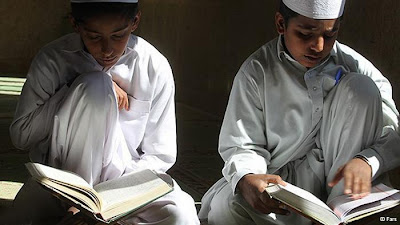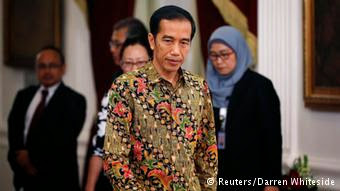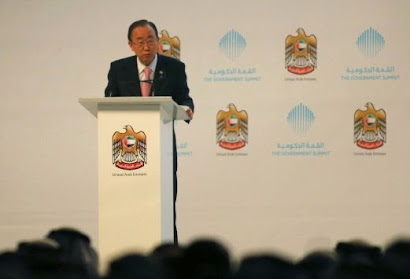Deutsche Welle, 23 August 2012
The civil
war in Syria is becoming a proxy war between Sunnis and Shiites, symbolized by
Saudi Arabia and Iran. Their differences originated in the early days of Islam.
If the
Prophet Mohammed had arranged a successor before his death in 632, the Islamic
landscape could have turned out differently.
But as
things turned out, the Prophet's fledging Islamic community disintegrated just
30 years after his death. The majority of Muslims joined a group that later
became known as the Sunnis. A second group consisted of followers of Ali ibn
Abi Talib, the cousin and son-in-law of Mohammed.
It is the
"Shi' at Ali," the party of Ali from which the Shiites originated. Up
to this day, the Shiites remain in the minority, accounting for between 10 to
15 percent of the more than 1.6 billion Muslims.
Early power
games
A personnel
controversy was sparked in 632 by the question of how to correctly select
Prophet Mohammed's successor, according to Lutz Berger, an Islamic scholar at
the University of Kiel. "At the beginning, we had a political conflict
about personnel decisions and group interests," he said. "Then the
political conflict turned religious."
 |
Protests followed the arrest of
a Shiite preacher in Saudi Arabia
|
The debate
about the rightful successor of Prophet Mohammed initially focused on the four
"rightly guided" caliphs, agreed on by a majority vote. In 660, the
Omayyad dynasty came to power. For those selecting the caliphs, it was of
paramount importance they be members of Mohammed's tribe, the Quraysh.
Followers
of Ali, however, believed the Prophet's successor should come from Mohammed's
family. They argued that God himself had appointed Ali as the successor, that
Mohammed had this succession recorded in writing before his death and that the
Sunni erased it from the Koran. To this day, the Koran forgery charge has not
been clearly withdrawn.
According
to Berger, Ali was ambitious and bothered by not being able to succeed as the
Prophet's successor. Finally, in 656, he was appointed the fourth and last
legitimate caliph. His reign lasted just five years - until he was
assassinated.
In
Damascus, the newly forming center of Islamic power, the Umayyads had the say,
while Ali followers secured supremacy in the frontier province of what is now
Iraq. In 680 Ali's youngest son, Hussein, was elected counter-caliph. That same
year, he was murdered by the Umayyads and buried in Karbala. With that, the
foundation was laid for the permanent division between the Sunni and Shiites as
well as the martyrdom cult in Shia Islam.
Early
hostility
"In
some ways, the Shiites were history's losers," says Berger. Ali and his
successors failed to prevail in the entire Islamic community, resulting in a
rather negative worldview and presumably Shia's own worldview that is shaped by
a concept of suffering and salvation.
 |
| Iranian Sunnis read the Koran
|
From a
Shiite perspective, the religious leaders, the Imams, are chosen by God. At the
end of time, a savoir will come to establish a divine kingdom of justice.
Belief in the Imam is one of the main differences to the Sunnah, which is the
passed down knowledge of Mohammed's words and deeds as guidance for Muslim
life.
To Shiites,
the Imam is a mediator between God and his follower because only the Imam alone
knows the hidden meaning of the Koran and has the task of communicating it to
the community. His teaching decisions are infallible; for the Shiites, his
sayings have the same authority as the Koran.
For many
Sunnis, that borders on heresy. "The Shiites are accused of deifying
people and seeing in Ali, the Prophet's son-in-law and his successors as
super-human figures, thus moving away from a basic principle of Islam; namely,
that there is only one God and that people should not be worshiped.
Lasting
consequences
If the
Shiites see themselves more as losers by refusing to participate in the secular
rule over the centuries, the "Sunnis, by comparison, are successful from
the start," says Islamic scholar Berger. They were able to play down the
conflicts of earlier times and viewed the Shiite domination claims as
troublemaking.
 |
Iraqi Shiites rally at the ruins of
a Shrine in Samarra
|
Even if the
Sunnis and Shiites define themselves through their mutual rejection – as Berger
puts it – phases of peaceful coexistence have historically alternated with
those of religious-motivated clashes. The current political conflicts in the
Islamic world are often religiously charged and show the some of the
traditional conflicts between Sunnah and Shia. There are many examples, such as
the civil wars in Syria and Iraq or the long-simmering conflict between Saudi
Arabia and Iran, the only country where Shia is the state religion.
Worldwide,
there are about 1.6 billion Muslims, of whom between 85 and 90 percent are
estimated to be Sunnis. No exact numbers exist because many countries have no
surveys of religious affiliation. Moreover, Shiites are not always willing to
disclose their religious affiliation in a non-Shiite environment.
Countries
from North Africa to the Sahara are mostly if not entirely Sunni. The same is
true for Saudi Arabia, Indonesia and Bangladesh. Syria and the Palestine
regions, too, are largely Sunni.
Iran is the
only country where Shia is the state religion. The majority of the population
in Iraq and Bahrain is also Shiite. About one third of Lebanon's population is
Shiite. Notable Shiite populations also exist in Afghanistan, Kuwait, Pakistan
and Syria.
(Subjects: Abraham, Isaac, Ishmael, Muhammad, Jesus, God, Jews, Arabs, EU, US, Israel, Iran, Russia, Africa, South America, Global Unity,..... etc.) (Text version)
" ..... If an Arab and a Jew can look at one another and see the Akashic lineage and see the one family, there is hope. If they can see that their differences no longer require that they kill one another, then there is a beginning of a change in history. And that's what is happening now. All of humanity, no matter what the spiritual belief, has been guilty of falling into the historic trap of separating instead of unifying. Now it's starting to change. There's a shift happening. ....."
“.. For centuries you haven't been able to think past that box of what God must be like. So you create a Human-like God with wars in heaven, angel strife, things that would explain the devil, fallen angels, pearly gates, lists of dos and don'ts, and many rules still based on cultures that are centuries old. You create golden streets and even sexual pleasures as rewards for men (of course) - all Human perspective, pasted upon God. I want to tell you that it's a lot different than that. I want to remind you that there are those who have seen it! Why don't you ask somebody who has had what you would call a near-death experience?
"Healing the Military Energies in our family Tree" – Jun 13, 2011 (Kryon channelled by David Brown)
“ … There’s much violence and anger throughout the world; when we look at the Middle East, we can see that changes are coming there. The West has a lot of power over the Middle East, but that power will begin to dissolve. The Muslim people of this world will begin to have their own power, and their own prosperity, and they will begin to disconnect from the Western World. This disconnection doesn’t have to be violent as violence only happens when somebody hangs onto what doesn’t belong to them....
... What Military Energy means if we use an analogy: it would be like putting grinding paste into the oil of your motor car. Once you release these energies you will begin to feel lighter as you disconnect from this reality, and, you will find it easier and easier to release any other negative emotions. Military Energies are the core of all your problems...."
















